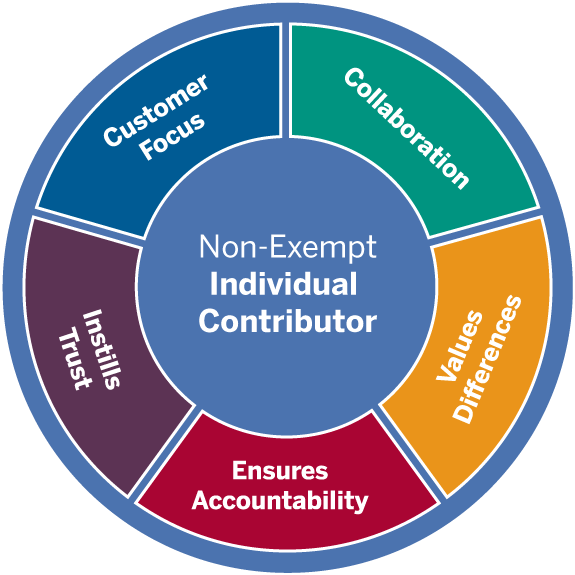Non-Exempt Individual Contributor: Mastery
Resourcefulness
Securing and deploying resources effectively and efficiently
There’s so much to do and so little time to do it. You have finite resources, yet infinite needs. Everyone has more to do then they can get to. Does this sound familiar? It’s life in organizations today. There are often more opportunities than there are people, time, and money available. The real trick is to produce results by making the best use of the limited resources available. Resourcefulness means finding a way to get things done, even when the odds are against you. Do not stall at the first roadblock but, instead look beyond the obvious for other viable approaches to accomplishing the goal. Resourcefulness means challenging yourself to do more with less and redefining what is possible.
You show this competency when you:
- Marshal resources (people, funding, material, support) to get things done
- Orchestrate multiple activities simultaneously to accomplish a goal
- Get the most out of limited resources
- Apply knowledge of internal structures, processes, and culture to resourcing efforts
How to develop this competency:
Lay out the work
Resourcefulness starts with a plan. A good plan leads to better use of resources and facilitates getting things done efficiently. Lay out the work from A to Z. What are your goals? What is mission critical and what is trivial? What’s the timeline? What resources do you need? Break complex projects into a series of tasks. Set aside 20 minutes at the start of each week to review your plan, prioritize, and manage your resources.
Manage your state of mind
Do you think it can’t be done? That it’ll never work? This is negative self-talk. It reinforces the beliefs that limit what is possible. Learn to eliminate negative self-talk and replace it with something more helpful. Look at complex problems and believe that they can be solved even when others tell you. Turn negatives such as: “I can’t do this” or “This is impossible” into positive questions such as: “How can I do this?” or “How is this possible?” What you think shapes your reality. In the words of Henry Ford: “Whether you think you can or you think you can’t, you’re right.”
Be creative
Resourcefulness is, in part, about finding creative new ways of doing things, or experimenting when an initial approach doesn’t work. If you find yourself relying on the same methods time after time, reflect on what’s preventing you from being more creative. Is it fear of failure? Being creative means putting what’s new and unique up for review and critique. Get out of your comfort zone. Focus on: “What haven’t I tried” or “What would happen if…” Think and act differently, try new things, and break free from your restraints.
Learn more:
- Book: Stretch: Unlock the Power of Less -and Achieve More Than You Ever Imagined Hardcover by Scott Sonenshein, Mike Chamberlain, et al
- Video: TED Limited Resources or Unlimited Resourcefulness: Getting More Done
- Article: Six Characteristics of Resourceful People That Bring Them Success
- LinkedIn Learning: Resourcefulness course collection

Non-Exempt Individual Contributor
- Core Competencies
- Demonstrates Self Awareness
- Being Resilient
- Self-Development
- Resourcefulness
Foundational
Intermediate
Mastery
